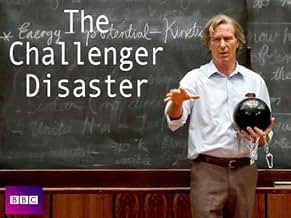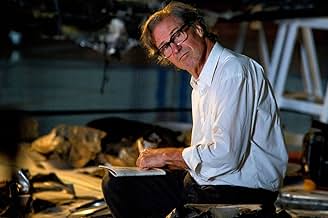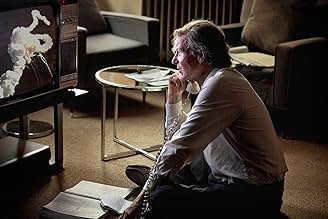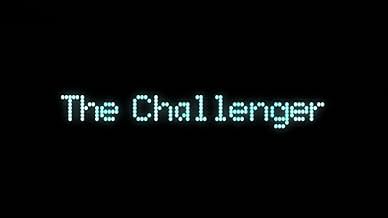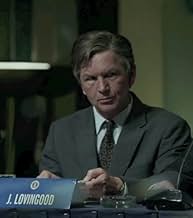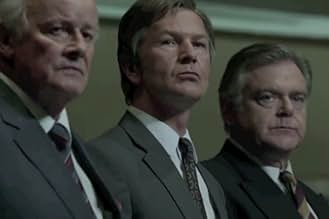Aggiungi una trama nella tua linguaFactual drama exploring the truth behind the space shuttle Challenger's 1986 disintegration.Factual drama exploring the truth behind the space shuttle Challenger's 1986 disintegration.Factual drama exploring the truth behind the space shuttle Challenger's 1986 disintegration.
- Regia
- Sceneggiatura
- Star
- Premi
- 1 vittoria e 2 candidature totali
- Michelle Feynman
- (as Megan Young)
- Judson Lovingood
- (as Sean C. Michael)
Recensioni in evidenza
Three agencies were involved in deciding to launch that freezing morning -- NASA, Raytheon, and Morton-Thiokol. This isn't made clear in the film, because the film is about Richard Feynman. But a New Yorker feature article years ago described what the agencies did about their doubts. Calls were made back and forth between the experts at each agency, each anxious to "check its six o'clock", and the question being asked gradually underwent evolution -- from "Should we launch?" to "Why SHOULDN'T we launch?" The results were disastrous.
A committee was formed to investigate the causes of the failure, with Feynman being the only independent members, all the others tied up with the military or with political considerations. But this isn't one of those dumb and oversimplified stories in which there is some sort of military/industrial conspiracy against the whistleblower. It belongs to the genre but is a pretty good example of it. So was the more commercially oriented "The Pentagon Wars." An example of a dumbed-down rendition is "The Insider," which really has little to say and shamelessly invents incidents to hype the drama.
William Hurt captures Feynman's personality with accuracy. Not his speech or his gestures. It's not an impression. But he has a grasp on Feyman's inner character -- devoted to science and outspoken. Feynman was actually quite a guy and might be described as abrasive. He didn't hesitate to demolish the ideas of others, whether they were equals or subordinates. He didn't do it viciously. He simply pointed out how stupid the notions were and then went on about his business.
The climactic scene is unforgettable. All the engineers (who generally hate physicists for having their heads in the clouds) are testifying before the committee and throwing up a blizzard of jargon about "ambient temperatures" and "Kelvin coefficients" and directions to "the Wheatstone Bridge" and other unfathomable cant in order to keep the water so murky that no one can detect their own part in the catastrophe. I won't give away the climax except to say that Feynman pulls a "Bill Nye, The Science Guy" stunt that shuts all the connivers up and embarrasses the experts.
The BBC put this out. I suppose they could afford to be a little less careful with American political sensibilities. William Hurt and his scowl of amazement is about perfect. Feynman's illness isn't dwelt on for sympathetic effect but it was real enough; he died a short time later.
Joanne Whalley is supportive as his wife, but the story is very much that of theoretical physicist Richard Feynman.
Bruce Greenwood is a vital link in the whole drama. He deserves a lot of credit for his strong portrayal of General Kutyna a disciplined loyal military man who acts as the catalyst for the truth to prevail. Greenwood looks like he was born in a uniform. He assumes the role as naturally as if he'd taken leave from the battlefield to make the movie.
Eve Best provides a solid and sensitive performance as Sally Ride (First woman in space). Her role in the Rogers Commission remains a mystery and we only learn of it just before the credits roll.
Brian Dennehy as William P. Rogers (Chairman and, former secretary of state) exudes the physical appearance of a persuasive man who has his own agenda and delivers a powerful performance. Dennehy is a master at conveying meaning in a story merely through the raising of an eyebrow, a glint in his eye or a subtle shift of body position.
One needs to make special mention of the good performance by many of the South Africans who were used in supporting roles. In particular Robert Hobbs who plays Allan J Macdonald a man torn between doing what is right whilst realizing the personal cost that might result.
There is no mention of the members who made up the "Rogers Commission". (Not even in the credits). The commission was comprised of some of the most influential members of the military and should surely be identified.
James Hawes directs with firmness and allows the story to flow and develop with fascinating insights into Feynman the scientist, but also Feynman the man and husband who had to fight his own person battles as a subplot.
Lukas Strebel camera shots are interesting. I feel the use of camera positioning where half the frame is blocked was at first novel, but maybe repeated too often and in some scenes it would have been better to allow the subject to take up the full frame.
The ending comes suddenly almost as if the editor had to condense the material into exactly 90 TV minutes. It is rumored that there might be a movie release where the running time will increase to 120 minutes. The Challenger is scheduled for the Discovery channel in the USA in November. Most probably renamed "73" – (Challenger broke apart 73 seconds into its flight).
There is nothing better than watching a likeable rogue with the brain the size of a planet take on Washington. Feynman was the only independent committee member and he bypassed the committee processes, general bureaucracy and cover ups and the political desire to not really find an airtight cause. Hurt is terrific and whilst they may have played a little fast and loose with the story (NASA later sued them and lost) it still makes for a fascinating and exciting 'thriller'.
Feynman was the critical independent factor which foiled such attempts when the Challenger exploded during take off in January 1986.
This factual account reveals Feynman was by chance adopted onto the investigative commission over the Challenger disaster at a time when he was critically ill. Unlike the rest of the commission members who had other agendas, Feynman approached the problem objectively and, through his popular demonstrations of physics for which he'd become famous, had the skill and passionate commitment to reveal the truth to the public. As he wrote in his report, 'For a successful technology, reality must take precedence over public relations, for nature cannot be fooled' Throughout this gripping drama you are taking the part of the underdog, frustrated at the increasing knowledge that the commission members, bar one or two, were driven by political agendas which meant the truth was trying to be covered up. Feynman represents the common man, and as such makes you part of the battle to foil the exasperating corruption.
William Hurt is magnificent playing Feynman, depicting non-conformist behaviour which is only tolerated because of his brilliance. I found his nuances of expression fascinating and wonderfully representative of how we, the public, would have reacted when faced with pompous authority attempting to control our behaviour. Brilliant stuff, and all the more telling because it is true.
Lo sapevi?
- QuizWhen Feynman is talking to Bill Graham from his home office, you can see a California vanity plate that partially spells out "TOUVA" on a shelf. Feynman and his friend Ralph Leighton, who transcribed his adventures into the books "Surely You're Joking" and "What Do You Care What Other People Think?" had been on a quest to visit the remote Asian country of Tuva, a country all but inaccessible to Westerners in the late 1980s. Leighton obtained the plate for his car. Sadly, their last, best scheme to reach Tuva fell into place two weeks after Feynman died of stomach cancer.
- BlooperWhen Feynman visits the Shuttle factory, the flight deck interior is clearly that of a Boeing 747-200. You can see the flight engineer's panel and the four throttles on the centre console, also the windscreen layout gives it away.
- Citazioni
Rogers: The other commissioners are just being respectful.
Richard Feynman: And you're saying I'm not? You understand the implications of the oxygen being activated? I do. The astronauts had to do that themselves. Which means they were ALIVE for at least some of those two minutes and thirty six seconds before they slammed into the ocean. Mr Rogers I'm an atheist, I personally doubt they're touching the face of God so I prefer to show my respect by finding the CAUSE of their appalling deaths and not stand around looking sad.
- ConnessioniFollows Challenger - lo shuttle della morte (1990)

